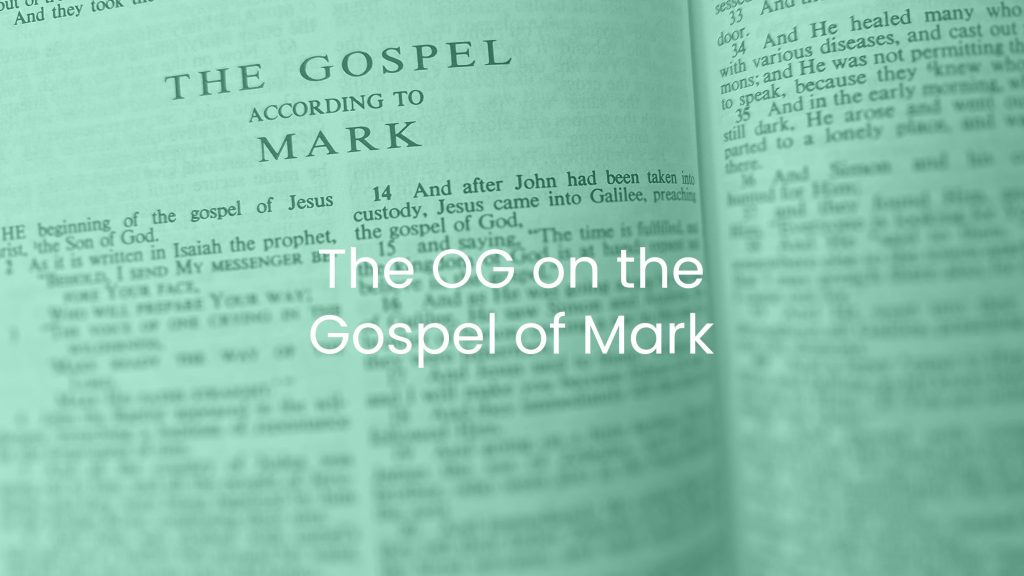|
Getting your Trinity Audio player ready...
|
The Gospel of Mark is fast-paced. Let’s read the first two verses:
This is the Good News about Jesus the Messiah, the Son of God. It began just as the prophet Isaiah had written (Mark 1:1-2a, NLT).
The Good News (gospel) is mentioned immediately, whereas the Gospel of Matthew opens with 17 verses of genealogy; the Gospel of Luke begins with the birth of John the Baptist and an angel visiting Mary; and John, in his gospel, talks at length about the Logos.
Mark takes a more direct approach with no genealogy, birth narrative, or philosophical instruction of the Logos becoming flesh and just says, “This is the good news.”
This direct approach exists throughout the entire gospel, with Mark often using the Greek word “euthus” or “immediately.” Immediately, immediately, immediately—I emphasize this word because it’s used 11 times in chapter one and about 45 times in the entire gospel.
Mark doesn’t let the proverbial moss grow under Jesus’s feet, as Jesus and the disciples travel immediately from place to place, with healings happening immediately,
But why does Mark use this word so often?
The Gospel of Mark was written for the Romans. Matthew wrote for the Jews who needed genealogy, Luke for Gentiles and Greeks who needed the virgin birth context, and John, writing last, explained the theological underpinnings of Jesus’s eternal relevance.
“Yawn!” All this wordiness in Matthew, Luke, and John would have bored the anxious, active, and industrious Romans.
In keeping with the active nature of this gospel, Mark gives a complete account of one day in the life of Jesus. We read in Mark 1:21-34 that Jesus immediately entered a synagogue, immediately cast out a demon, then immediately left the synagogue to heal Simon’s mother-in-law, and finished the day when the entire city brought Jesus their sick, and He healed them all.
No wonder Mark writes that the next day, “Jesus departed and went to a solitary place to pray.” Even Jesus could get too much of “immediately!”
The Gospel of Mark uniquely focuses on four points of conflict with the Jewish leaders—Jesus’ claim to forgive sins, eating with tax collectors and sinners, His disciples not fasting regularly, and rules about the Sabbath. As I’ve read this book through the years, I’ve thought, “Well, the Romans typically didn’t like the Jews, so maybe they would identify better with a Jesus who was in constant conflict with them as well?”
Again, this is just me, but a more accepted scholastic thought considers the climax or focus of the book. Mark begins with “this is the good news (gospel)” in chapter one, and in chapter eight, we find the good news personified—what the gospel is all about:
Jesus asked them, “Who do people say I am?” “Well,” they replied, “some say John the Baptist, some say Elijah, and others say you are one of the other prophets.” Then he asked them, “But who do you say I am?” Peter replied, “You are the Messiah” (Mark 8:27b-29).
Mark was not one of the principal disciples of Jesus. However, chapter 14 contains an odd account of a young man being grabbed during the arrest of Jesus, leaving his cloak in the clutches of the soldiers, and then running away naked.
Many believe this young man was John Mark, the son of the woman where perhaps the Last Supper was eaten. Many also believe this young man became Mark, who wrote the Gospel.
In heaven, we will have a good laugh with Mark about how he included a reference to himself in his Gospel about Jesus.
Let’s immediately read the Gospel of Mark this week!

